Contents
About the Book
Language is mankinds greatest invention except of course, that it was never invented. So begins Guy Deutschers enthralling investigation into the evolution of language. No one believes that the Roman Senate sat down one day to design the complex system that is Latin grammar, and few believe, these days, in the literal truth of the story of the Tower of Babel. But then how did there come to be so many languages, and of such elaborate design? If we started off with rudimentary utterances on the level of man throw spear, how did we end up with sophisticated grammars, enormous vocabularies, and intricately nuanced shades of meaning?
Drawing on recent, groundbreaking discoveries in modern linguistics, Deutscher exposes the elusive forces of creation at work in human communication. We learn why German maidens are neuter while German turnips are female, why we have feet not foots, and how great changes of pronunciation may result from simple laziness
For Janie
maar ulmim u balim ina riki ay ipparku
INTRODUCTION
This Marvellous Invention
Of all mankinds manifold creations, language must take pride of place. Other inventions the wheel, agriculture, sliced bread may have transformed our material existence, but the advent of language is what made us human. Compared to language, all other inventions pale in significance, since everything we have ever achieved depends on language and originates from it. Without language, we could never have embarked on our ascent to unparalleled power over all other animals, and even over nature itself.
But language is foremost not just because it came first. In its own right it is a tool of extraordinary sophistication, yet based on an idea of ingenious simplicity: this marvellous invention of composing out of twenty-five or thirty sounds that infinite variety of expressions which, whilst having in themselves no likeness to what is in our mind, allow us to disclose to others its whole secret, and to make known to those who cannot penetrate it all that we imagine, and all the various stirrings of our soul. This was how, in 1660, the renowned grammarians of the Port-Royal abbey near Versailles distilled the essence of language, and no one since has celebrated more eloquently the magnitude of its achievement. Even so, there is just one flaw in all these hymns of praise, for the homage to languages unique accomplishment conceals a simple yet critical incongruity. Language is mankinds greatest invention except, of course, that it was never invented.
This apparent paradox is at the core of our fascination with language, and it holds many of its secrets. It is also what this book is about.
Language often seems so skilfully drafted that one can hardly imagine it as anything other than the perfected handiwork of a master craftsman. How else could this instrument make so much out of barely three dozen measly morsels of sound? In themselves, these configurations of the mouth p, f, b, v, t, d, k, g, sh, a, e and so on amount to nothing more than a few haphazard spits and splutters, random noises with no meaning, no ability to express, no power to explain. But run them through the cogs and wheels of the language machine, let it arrange them in some very special orders, and there is nothing that these meaningless streams of air cannot do: from sighing the interminable ennui of existence (not tonight, Josephine) to unravelling the fundamental order of the universe (every body perseveres in its state of rest, or of uniform motion in a right line, unless it is compelled to change that state by forces impressed thereon).
The most extraordinary thing about language, however, is that one doesnt have to be a Napoleon or a Newton to set its wheels in motion. The language machine allows just about everybody from pre-modern foragers in the subtropical savannah, to post-modern philosophers in the suburban sprawl to tie these meaningless sounds together into an infinite variety of subtle senses, and all apparently without the slightest exertion. Yet it is precisely this deceptive ease which makes language a victim of its own success, since in everyday life its triumphs are usually taken for granted. The wheels of language run so smoothly that one rarely bothers to stop and think about all the resourcefulness and expertise that must have gone into making it tick. Language conceals its art.
Often, it is only the estrangement of foreign tongues, with their many exotic and outlandish features, that brings home the wonder of languages design. One of the showiest stunts that some languages can pull off is an ability to build up words of breath-breaking length, and thus express in one word what English takes a whole sentence to say. The Turkish word ehirliletiremediklerimizdensiniz, to take one example, means nothing less than you are one of those whom we cant turn into a town-dweller. (In case you are wondering, this monstrosity really is one word, not merely many different words squashed together most of its components cannot even stand up on their own.) And if that sounds like some one-off freak, then consider Sumerian, the language spoken on the banks of the Euphrates some 5,000 years ago by the people who invented writing and thus kick-started history. A Sumerian word like munintumaa (when he had made it suitable for her) might seem rather trim compared to the Turkish colossus above. What is so impressive about it, however, is not its lengthiness, but rather the reverse: the thrifty compactness of its construction. The word is made up of different slots  , each corresponding to a particular portion of meaning. This sleek design allows single sounds to convey useful information, and in fact even the absence of a sound has been enlisted to express something specific. If you were to ask which bit in the Sumerian word corresponds to the pronoun it in the English translation when he had made it suitable for her, then the answer would have to be nothing. Mind you, a very particular kind of nothing: the nothing that stands in the empty slot in the middle. The technology is so fine-tuned, then, that even a non-sound, when carefully placed in a particular position, has been invested with a specific function. Who could possibly have come up with such a nifty contraption?
, each corresponding to a particular portion of meaning. This sleek design allows single sounds to convey useful information, and in fact even the absence of a sound has been enlisted to express something specific. If you were to ask which bit in the Sumerian word corresponds to the pronoun it in the English translation when he had made it suitable for her, then the answer would have to be nothing. Mind you, a very particular kind of nothing: the nothing that stands in the empty slot in the middle. The technology is so fine-tuned, then, that even a non-sound, when carefully placed in a particular position, has been invested with a specific function. Who could possibly have come up with such a nifty contraption?
My own curiosity about such questions arose when, as a boy, I first came across a strange and complex structure in a foreign language, the Latin case system. As it happened, I was not particularly put out by the idea that learning a language involved memorizing lots of fiddly new words. But this Latin set-up presented a wholly unfamiliar concept, which looked intriguing but also rather daunting. In Latin, nouns dont just have one form, but come in many different shapes and sizes. Whenever a noun is used, it must have an ending attached to it, which determines its precise role in the sentence. For instance, you use the word cactus when you say the cactus pricked me, but if you prick it, then you must remember to say cactum instead. When you are pricked by the cactus, you say cacto; but to pick the fruit of the cactus, you need to say cacti. And should you wish to address a cactus directly (O cactus, how sharp are thy prickles!), then you would have to use yet another ending, cacte. Each word has up to six different such cases, and each case has distinct endings for singular and plural. Just to give an idea of the complexity of this system, the set of endings for the noun
Next page
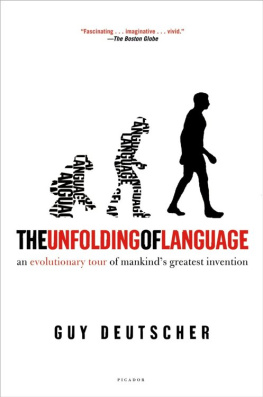
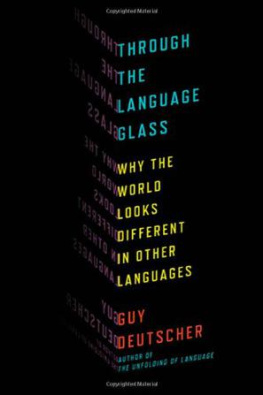
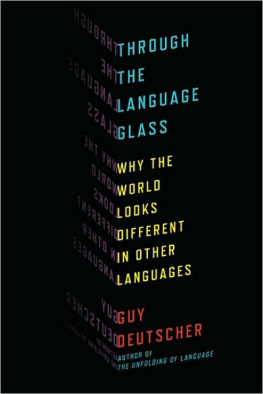

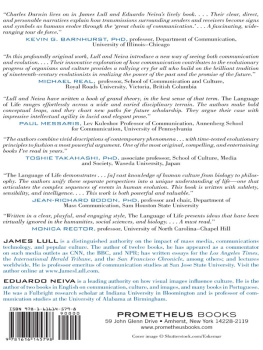
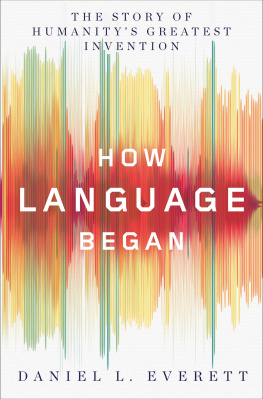

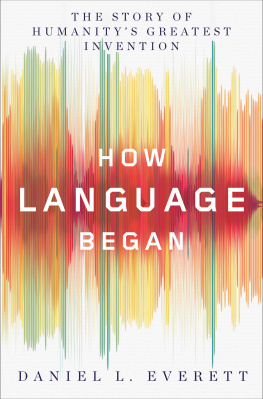
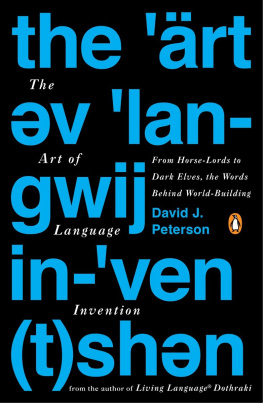
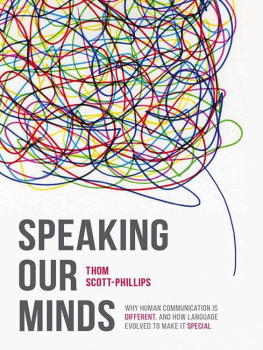
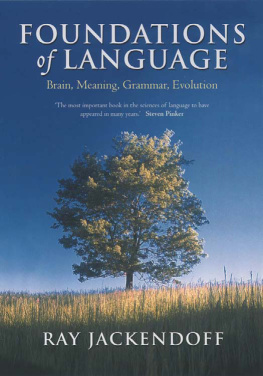

 , each corresponding to a particular portion of meaning. This sleek design allows single sounds to convey useful information, and in fact even the absence of a sound has been enlisted to express something specific. If you were to ask which bit in the Sumerian word corresponds to the pronoun it in the English translation when he had made it suitable for her, then the answer would have to be nothing. Mind you, a very particular kind of nothing: the nothing that stands in the empty slot in the middle. The technology is so fine-tuned, then, that even a non-sound, when carefully placed in a particular position, has been invested with a specific function. Who could possibly have come up with such a nifty contraption?
, each corresponding to a particular portion of meaning. This sleek design allows single sounds to convey useful information, and in fact even the absence of a sound has been enlisted to express something specific. If you were to ask which bit in the Sumerian word corresponds to the pronoun it in the English translation when he had made it suitable for her, then the answer would have to be nothing. Mind you, a very particular kind of nothing: the nothing that stands in the empty slot in the middle. The technology is so fine-tuned, then, that even a non-sound, when carefully placed in a particular position, has been invested with a specific function. Who could possibly have come up with such a nifty contraption?